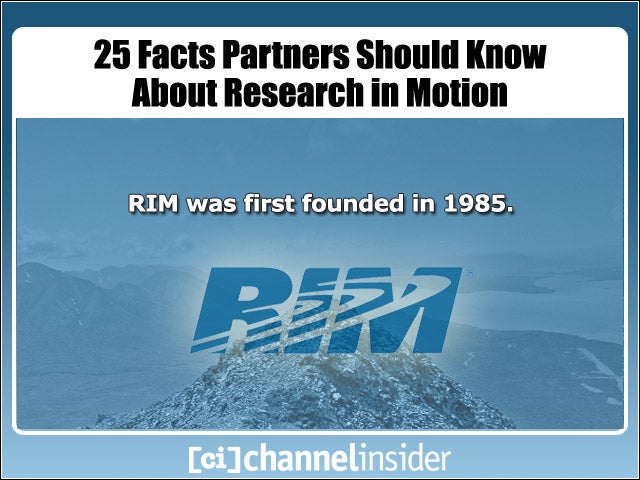 25 Facts About Research in Motion
25 Facts About Research in Motion
RIM was first founded in 1985.
 No Title
No Title
It’s initial focus wasn’t on telecom. One of its first gigs was building networked LED display terminals for General Motors’ assembly line.
 No Title
No Title
In the early 1990s, RIM founder Mike Lazaridis won an Oscar and an Emmy for developing a high-speed film barcode scanner that revolutionized Hollywood film editing.
 No Title
No Title
RIM first started working with companies such as AT&T, Rogers and Ericsson in the late 1980s, working on modems and radios.
 No Title
No Title
The process of blossoming into a telecom giant was aided by a $5,000,000 Canadian infusion of venture capital in 1995.
 No Title
No Title
RIM’s first big breakthrough was the release of the BlackBerry’s predecessor in 1996, the Inter@ctive Pager 900, the first ever pocket-sized, two-way pager.
 No Title
No Title
The company went public two years later.
 No Title
No Title
The next year, 1999, RIM released the first BlackBerry 850, which started out as a two-way pager.
 No Title
No Title
The addition of voice capabilities was tacked onto the BlackBerry’s list of accomplishments in 2002.
 No Title
No Title
Last year, RIM reported that it had tipped over the mark of 100 million BlackBerry devices shipped since the product line was first launched.
 No Title
No Title
RIM employs 14,000 people worldwide.
 No Title
No Title
According to the company, there are over 41 million BlackBerry device customers worldwide.
 No Title
No Title
Over 250,000 organizations worldwide use BlackBerry Enterprise Server.
 No Title
No Title
More than 2,000 IT professionals are BlackBerry certified.
 No Title
No Title
The US government has armed more than 500,000 users with BlackBerry devices.
 No Title
No Title
The governments of the United Arab Emirates and Bahrain recently lamented that BlackBerry devices were a "security threat" because the device is equipped with such strong encryption and data is run through RIM servers outside of those countries.
 No Title
No Title
According to market analyst firm comScore, Android recently overtook BlackBerry’s position as the largest mobile platform, with Google earning 31.2 percent share over RIM’s 30.4 percent last quarter.
 No Title
No Title
Last year RIM increased revenue by 36 percent to $5.6 billion.
 No Title
No Title
Last quarter, RIM made 81 percent of its revenues from devices, 16 percent from service and 3 percent from software.
 No Title
No Title
In 2010 RIM purchased platform-builder QNX Software systems from Harman International.
 No Title
No Title
In 2012 RIM says it will migrate BlackBerry to the QNX platform, which is known for reliability, low power consumption and its ability to run Flash and 3D graphics.
 No Title
No Title
In spite of strong earnings, investors have been squirrelly about RIM’s prospects lately due to pressure from Google and Apple.
 No Title
No Title
The analyst community even said most recently that "management statements hint that RIM overstuffed the sales channel at the end of last quarter."
 No Title
No Title
The company is hoping to head off any decline with the April release of its BlackBerry PlayBook tablet, which will not only be able to run the current BlackBerry OS, but also Android and QNX.
 No Title
No Title
RIM says that it will release the PlayBook tablet through over 20,000 retail outlets in North America.

